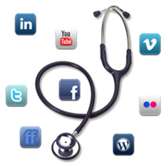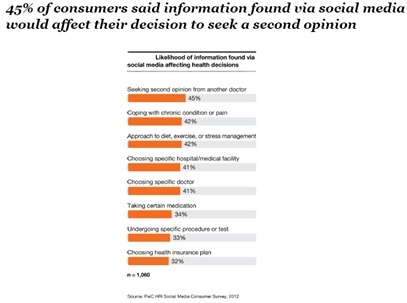Social Media and the Breast Cancer Surgeon

The term social media encompasses social networking sites, blogs, collaborative services, content hosting sites and virtual communities. Social media includes all forms of electronic communication through which users create and engage in online communities to share ideas and other information and comprise a number of online and mobile resources that provide a forum for the generation, sharing, and discussion of content. Every year, social media increasingly integrates with almost every aspect of daily life, so it’s not surprising that social media is beginning to work its way into the healthcare arena, and with the growth of social media platforms, their potential to affect health care continues to expand.
As a rule, although doctors tend to embrace technology, we have been slow to embrace social media, which is probably not all that surprising, as we are generally risk-averse by nature. We tend to keep our heads down, stay out of trouble and therefore don’t dare to engage in online conversation. It has however been said that “One of the greatest risks of social media is ignoring social media. It’s out there, and people are using it whether you like it or not. You don’t know, what you don’t know.”
As a breast cancer surgeon, every single operation I perform involves some degree of risk, in order to achieve a clinical benefit, and the key is in accurately assessing the risk/benefit analysis. The same holds true for the involvement of doctors in social media, and overall I think there is more potential benefit and opportunity than risk involved.
Use of social networking sites has grown from 8% of all adults online in 2005, to 67% in late 2012 and up to 72% of U.S. adults online in May 2013. With more than 800 million active Facebook users (half of them log on each day) and 100 million active Twitter users, health professionals cannot afford to ignore social media as a powerful means for reaching out to patients and the general public.
Social media channels are huge potential portals for sharing information with patients, and can be used as a means of increasing patients’ knowledge of their own health concerns, allowing them to take more initiative in their own health care. Furthermore, social media and the internet provide patients with increasingly abundant opportunities to communicate with people who have or have had similar health experiences. Studies have shown that when discussing sensitive health topics among breast cancer survivors, several benefits exist in online social networking. These benefits include reduced feelings of isolation and uncertainty and increased patient education before and after their visit.
Health care professionals have slowly begun to use social media to communicate and stay connected with patients and blogs are a major part of how online visitors consume information, interact online and make decisions about healthcare. It makes sense to me that health professionals should go where people are already online (on social media), rather than just build their own isolated web islands of ‘read-only’ information and expect people to come and visit. If you want to connect with people and be part of their community, you need to go where the community is-” fish where the fish are biting”
A US research study by Pew (2013) (1) found that 72% of internet users were “online health seekers”- that is, they searched the web for some type of healthcare information and 61% look online for health information regularly. (39% of online health seekers say they looked for information related to their own situation, another 39% say they looked for information related to someone else’s health or medical situation and an additional 15% of these internet users say they were looking both on their own and someone else’s behalf.) They found that women are more likely than men to go online to figure out a possible diagnosis. Other groups that have a high likelihood of doing so include younger people, white adults, those who live in households earning $75,000 or more, and those with a college degree or advanced degrees. In 2009, 85% of online Europeans in the United Kingdom, Germany, France, Italy, and Spain turned to the internet and other digital technologies for health information. (2)
Social media is still generally utilized more by younger age cohorts, in contrast to web-based information sources and more familiar communication tools such as email. Recent surveys indicate that 89% of 18-29 year olds use social media compared to just 43% of people aged 65+. Age is one of the major differentiating factors for the usage of social networking sites, where usage is less dependent on gender, education, income or other forms of social advantage. The difference of utilization by age groups will obviously diminish over the next years and decades as digital natives increase their involvement and influence professionally and privately within their networks.
According to a Health Industries Group/PwC (Price Waterhouse Coopers) study (3), the affect of social media on health decisions is strong—and evidently growing—with over 40 percent of respondents saying it would influence issues of second opinion, or their choice of doctor, hospital or medical facility. (see below)

Patients also report that access to online health information makes them feel empowered because they have the knowledge to ask their physicians well-informed questions. Given time-restricted consultations, patients perceive the internet to be particularly useful for confirming and expanding on information. Patients see the internet as an additional resource to support existing and valued relationships with their physicians. Breast cancer patients can potentially benefit from social media sites throughout their entire journey, from diagnosis, through treatment, rehabilitation and the survivorship phase.
-
Fox S, Duggan M. Health online 2013. Health. 2013;
Available from: pewinternet.org/Reports/2013/Health-online.aspx.
- manhattanresearch.com/News-and-Events/Press-Releases/online-europeans-use-internet-for-health
- www.pwc.com/us/en/health-industries/publications/health-care-social-media.jhtml











